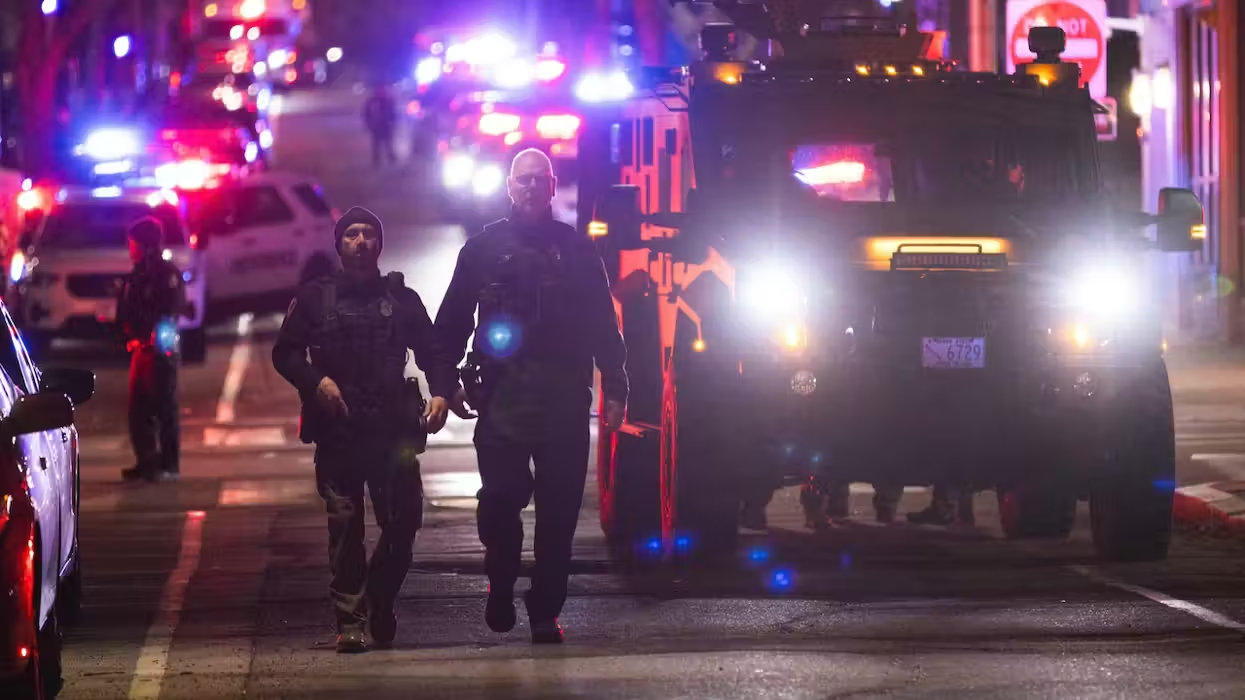
© 2025 Blaze Media LLC. All rights reserved.
National Police Week in Washington, D.C., this year means a fresh list of pro-cop bills will be facing votes on Capitol Hill.
This week the house will vote on several measures aimed at better supporting America’s state and local police forces, from increased and targeted training resources, to hiring preferences for veterans, to increased penalties for cop slayings, to harsher penalties for police assailants.
Here’s what they are and what they do.
H.R. 115, Thin Blue Line Act, seeks to increase penalties on cop-killers.
In recent years, America’s law enforcement officers and other first responders have found themselves under increasing fire amid a wave of anti-police sentiment. The Thin Blue Line Act changes federal criminal law to trigger death penalty considerations for the killing or attempted killing of a police officer, firefighter, or other first responder and covers federal, state, and local officials.
William J. Johnson, executive director of the National Association of Police Organizations (NAPO), lauded the bill in January, citing a steep increase in targeted, ambush-style killings of police officers.
“Establishing stricter penalties for those who harm or target law enforcement officers will deter crime,” Johnson said in a press release for the bill’s sponsor, Rep. Vern Buchanan, R-Fl. “Any persons contemplating harming an officer must know that they will face serious punishments.”
H.R. 1892, the Honoring Hometown Heroes Act, changes the federal flag code to give governors and the D.C. mayor the authority “to proclaim that the U.S. flag shall be flown at half-staff in the event of the death of a first responder (public safety officer) working in such jurisdiction who dies while serving in the line of duty.”
“First responders are the Nation’s front line of defense here at home,” reads a statement from Rep. John Larson, D-Conn., who sponsored the bipartisan bill. “In the unfortunate times when the ultimate sacrifice is given, they deserve the respect of having our Nation’s flag flown at half-staff. Amending the Flag Code is the least we can do.”
H.R. 1428, the Law Enforcement Heroes Act, sponsored by Texas Republicans Rep. Will Hurd in the House and Sen. John Cornyn in the upper chamber, seeks to make sure that America’s battlefield heroes are given first preference to keep protecting and serving their fellow citizens once they come home. The bill would change decades-old federal law to ensure that veterans are given preference for employment and training with federal grant money.
“We owe the men and women who have fought for our freedoms the smoothest transition possible to civilian life. One of the best ways we can do this is to provide outlets for these heroes to continue their service right here at home,” reads a press release from Hurd. “Not only are we providing an occupational service to vets, but we are funneling trained professionals to police departments and making our communities safer.”
H.R. 1616, the Strengthening State and Local Cyber Crime Fighting Act of 2017, is meant to give local police departments more resources and training to combat cyber crimes.
“Cyber elements add layers of complexity to the crimes our local law enforcement officers face every day,” reads a statement from the bill’s sponsor, Rep. John Ratcliffe, R-Texas, “and we’ve got to make sure they have access to the training they need to address this trend.”
The bill amends federal law and authorizes a National Computer Forensics Institute to train state and local police officers in how to best combat cyber-crime – an increasingly urgent necessity in modern policing.
“We’ve all seen crime shows on TV where pieces of DNA evidence – a strand of hair or a drop of blood – solve the case,” the press release continues. “But in today’s world, we also have to consider digital evidence. This could be an email that was sent, an online purchase, or geolocation technology that places an individual at the scene of a crime.”
H.R. 1039, Probation Officer Protection Act, seeks to give probation officers more leeway to enforce the law when doing their jobs. It does this by permitting probation officers to arrest third-party offenders when conducting activities related to probation or release, rather than just the people they oversee.
Currently, probation officers are not granted this authority, leaving them to retreat in situations where a third party may physically interfere with their jobs or try to physically harm them in the line of duty.
“Hostile and at times threatening environments are part of a probation officer’s average day on the job,” reads a press release from the bill’s House sponsor, Rep. Dave Reichert, R-Wash. “Although they encounter many of the same dangers faced by members of the law enforcement community, they do not have the same tools to protect themselves. This bipartisan, bicameral bill rights that wrong.”
The bills will be voted on throughout the legislative week, with the last one currently scheduled for Thursday.
Want to leave a tip?
We answer to you. Help keep our content free of advertisers and big tech censorship by leaving a tip today.
Want to join the conversation?
Already a subscriber?
more stories
Sign up for the Blaze newsletter
By signing up, you agree to our Privacy Policy and Terms of Use, and agree to receive content that may sometimes include advertisements. You may opt out at any time.
Related Content
© 2025 Blaze Media LLC. All rights reserved.
Get the stories that matter most delivered directly to your inbox.
By signing up, you agree to our Privacy Policy and Terms of Use, and agree to receive content that may sometimes include advertisements. You may opt out at any time.






